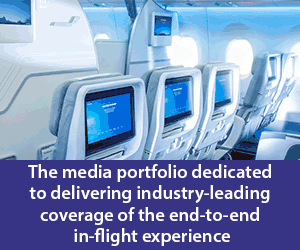Inflight editor Alexander Preston summarises the latest happenings across IFEC and cabin technology.
The latest edition of the Civil Aviation Authority’s (CAA) ‘UK Aviation Consumer Survey’ has shown falling levels of overall satisfaction with the flying experience.
The fifth wave of its annual consumer research tracking study is used by the CAA to develop a deeper understanding of UK consumers’ flying behaviours and their attitudes towards the aviation industry.
Unsurprisingly, the survey found that holidays remain the primary reason for taking a flight (72%), followed by visiting friends or family (19%). In order to save money, around one in five flew with a no-frills airline (22%), and 20% took only hand luggage – will we see more ticket options being introduced in the same vein as Virgin Atlantic’s Basic, Classical and Delight models?
Though the majority of passengers (78%) travel economy class, there are more passengers travelling in premium economy (14% in 2018 vs. 8% in Oct 2017) justifying the increased investment airlines are making in this cabin class.
First class has also seen a significant increase (4% in 2018 vs. 1% in Oct 2017) providing a contradictory barometer to those carriers phasing out first class in preference for business class cabins.
One of the key identified drivers of consumer satisfaction is their experience onboard the plane. CAA analysis shows this element of the journey has the strongest impact on levels of satisfaction compared to other aspects.
The survey found that passengers are typically less satisfied with the in-flight experience than other aspects of flying. Travellers have become less satisfied with their experience onboard since the survey began, with 81% satisfied in spring 2016, compared to 77% in the latest wave.
For disabled passengers this falls to 73%, which is disappointing as close to one-in-five disabled travellers say they expect to fly more (19%) in the next year. Of those who find flying difficult, seven in ten (70%) say they think they would require specific assistance from their airport or airline.
Interestingly, passengers with reduced mobility are less likely to fly economy than the average passenger (60% vs. 78% of all passengers), and slightly more likely to travel first class (13% vs. 4%), business class (9% vs. 6%) and premium economy (19% vs. 14%).
Of all the innovations and investment towards the front of the cabin, how much of this takes into account the needs of the disabled passenger?
Passenger satisfaction with the onboard and in-flight experience is the lowest of all the elements tested. If this were to be improved says the CAA, levels of satisfaction with the overall flying experience for all passenger groups would likely improve by a significant amount.
In the same week as thousands of UK students receive their exam results, it seems the UK aviation industry is graded a ‘B’ – could try harder.
The editor’s comment is published weekly as an accompaniment to the Inflight e-newsletter. If you do not currently receive our email updates, you can subscribe here.






